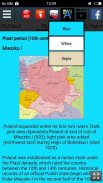








History of Poland

History of Poland ਦਾ ਵੇਰਵਾ
The history of Poland results from the migrations of Slavs who established permanent settlements on the Polish lands during the Early Middle Ages. In 966 AD, Duke Mieszko I of the Piast dynasty adopted Western Christianity; in 1025 Mieszko's son Bolesław I Chrobry formally established a medieval kingdom. The period of the Jagiellonian dynasty in the 14th-16th centuries brought close ties with the Grand Duchy of Lithuania, a cultural Renaissance in Poland and territorial expansion that culminated in the establishment of the Polish–Lithuanian Commonwealth in 1569.
The Commonwealth in its early phase represented a continuation of Jagiellonian prosperity, with its remarkable development of a sophisticated noble democracy. From the mid-17th century the huge state entered a period of decline caused by devastating wars and by the deterioration of the country's political system. Significant internal reforms were introduced during the later part of the 18th century, especially in the Constitution of May 3, 1791, but neighboring powers did not allow the reform process to continue. The independent existence of the Commonwealth ended in 1795 after a series of invasions and partitions of Polish territory carried out by the Russian Empire, the Kingdom of Prussia, and the Austrian Habsburg Monarchy.
























